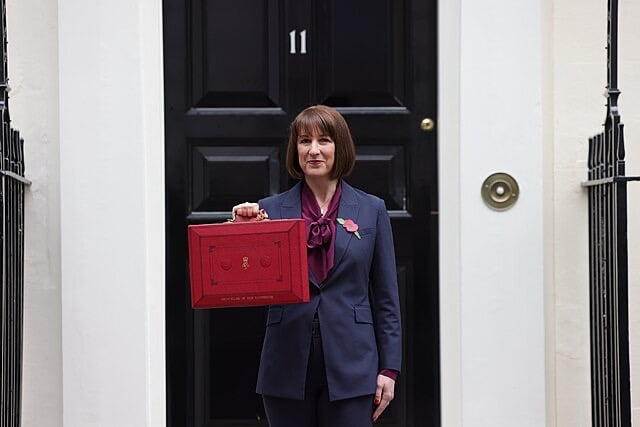Tesco is trialling shorter opening hours at some Express stores, closing at 10pm rather than 11pm, after being hammered by a £235million rise in staff costs from Rachel Reeves’s devastating tax raid.
Britain’s biggest supermarket is understood to be testing reduced hours at less profitable stores, which have been internally dubbed “Express Lite” shops, as the retail giant scrambles to offset the Chancellor’s punishing Budget measures.
The changes come after the Chancellor’s Budget took effect in April, with employers now paying National Insurance equivalent to 15 per cent of workers’ pay packets, up from 13.8 per cent previously – a move that has sent shockwaves through the retail sector.
£1billion tax bombshell
The true scale of the damage to Tesco has been laid bare in shocking analysis that reveals the supermarket faces a staggering £1billion increase in its National Insurance bill over the next four years.
According to analysis by Morgan Stanley, the grocer, which employs 300,000 UK workers, will see its costs soar by £250million annually when the changes roll out – a crippling blow to Britain’s biggest private employer.
The changes brought in by Chancellor Rachel Reeves‘ first Budget mean that from April 2025, employers’ National Insurance contributions will rise from 13.8% to 15% on a worker’s earnings above £175 a week.
Customers face price hikes
The devastating impact of Labour’s tax raid threatens to hit shoppers directly in the pocket, with industry experts warning that price rises of up to 8 per cent could be on the horizon as retailers desperately try to recoup their losses.
Sainsbury’s chief executive Simon Roberts has already warned that the National Insurance increase will lead to price inflation, with his company facing a £140million hit – more than 50% year on year.
M&S has also refused to rule out price rises after revealing it faces an extra £60million on its National Insurance bill, while desperately searching for new cost-saving measures.
Express stores bear the brunt
The decision to target Express stores for reduced hours represents a significant shift for Tesco, which operates over 1,800 of these convenience outlets across England – typically the last resort for late-night shoppers needing essential items.
These stores, which usually close at 10pm or 11pm, have become a lifeline for communities, particularly in areas where larger supermarkets have restricted Sunday trading hours or close early.
The internal designation of “Express Lite” for less profitable stores suggests a two-tier system emerging within Tesco’s convenience estate, as the company battles to maintain profitability in the face of soaring costs.
Retail sector in crisis
The supermarket sector faces a collective £200million blow from the National Insurance hike, with the Big Four – Tesco, Sainsbury’s, Asda and Morrisons – all scrambling to find ways to absorb the shock.
Asda estimates the change will add an extra £100million to its tax bill, piling pressure on a sector already battling fierce competition from German discounters Aldi and Lidl.
One analyst estimated that Tesco alone could face £75million added to its bill from the initial changes, but the true figure appears to be far worse as the full impact becomes clear.
Jobs at risk
With Tesco’s market share standing at 28.5% – meaning more than one in every four pounds spent on groceries goes through its tills – any changes to its operations have massive implications for communities across Britain.
The reduced hours trial raises serious questions about job security for the thousands of workers who staff these stores during evening shifts, with many facing potential cuts to their working hours.
Industry insiders warn this could be just the beginning, with more drastic measures potentially on the horizon if the trials prove successful in cutting costs.
Budget blamed for retail pain
The Chancellor’s decision to implement the National Insurance hike has been branded a “short-term, easy fix” by business leaders, with M&S chief executive Stuart Machin warning it will make “economic recovery harder.
The structural change to the threshold is particularly damaging for retailers like Tesco, as it brings more low-paid and part-time workers into the scope of employer contributions – hitting businesses with large workforces especially hard.
From next April, employers will face a national insurance rate of 15 per cent on salaries above £5,000, down from the current threshold of £9,100 – a change that dramatically increases the tax burden on businesses.
Treasury under fire
The Conservatives have slammed Labour for failing to publish a tax impact assessment alongside the national insurance rise, with Shadow Chancellor Mel Stride calling it “unacceptable that Labour are withholding this critical analysis.
A Treasury spokesman defended the measures, claiming “difficult choices” had to be made to restore economic stability, adding that “more than half of employers will either see a cut or no change in their national insurance bills.
However, for giants like Tesco with their massive workforces, such reassurances ring hollow as they grapple with unprecedented cost pressures.
What it means for shoppers
As Tesco trials these reduced hours, late-night shoppers face the prospect of finding their local Express stores closed when they need them most – whether for emergency supplies, forgotten ingredients, or simply the convenience of shopping outside traditional hours.
The move represents a significant retreat from the 24/7 retail culture that has become embedded in British life, with convenience stores often the only option for shift workers, parents with young children, or those unable to shop during regular hours.
With other major retailers likely watching Tesco’s trials closely, this could mark the beginning of a wider rollback of opening hours across the sector as businesses struggle to cope with Labour’s tax assault on enterprise.
Image credit: The Chancellor delivers the Autumn Budget 2024 by Kirsty O’Connor / HM Treasury, licensed under the Open Government Licence v3.0, via Wikimedia Commons.



